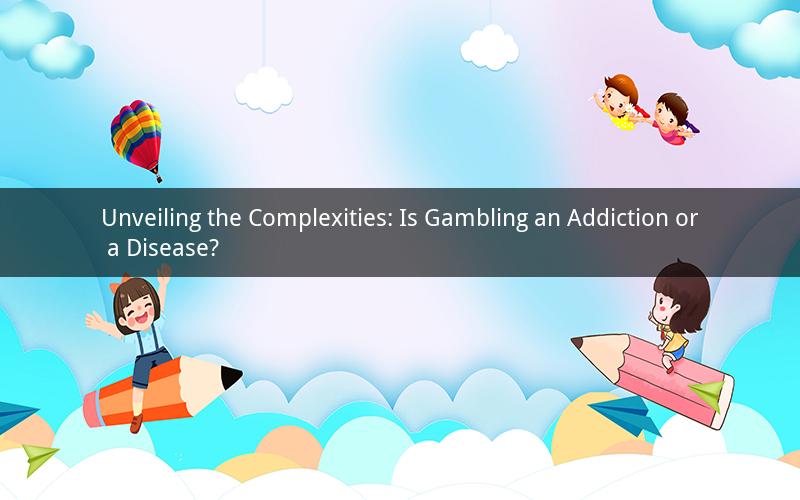
Introduction:
Gambling has been a subject of debate for years, with many questioning whether it is an addiction or a disease. This article delves into the various perspectives and examines the underlying factors that contribute to this ongoing controversy. By exploring the psychological, physiological, and social aspects of gambling, we aim to provide a comprehensive understanding of this complex issue.
I. Understanding Gambling
1. Definition of Gambling:
Gambling refers to the act of wagering something of value on an uncertain event with the intention of winning something of greater value. It involves elements of chance and risk, and can be found in various forms, such as lottery, sports betting, casino games, and online gambling.
2. Types of Gamblers:
Gamblers can be categorized into different types based on their behavior and attitude towards gambling. These include casual gamblers, social gamblers, problem gamblers, and pathological gamblers.
II. Addiction or Disease?
1. Addiction:
Addiction is a chronic, relapsing brain disorder characterized by compulsive drug seeking and use despite harmful consequences. Many experts argue that gambling can be classified as an addiction due to its addictive nature and the potential for harmful consequences.
a. Psychological Symptoms:
Gamblers may experience psychological symptoms such as anxiety, depression, and impulsivity, which are commonly associated with addiction.
b. Behavioral Symptoms:
Gambling addicts often exhibit behavioral symptoms like preoccupation with gambling, increased tolerance, and unsuccessful attempts to stop gambling.
2. Disease:
On the other hand, some experts argue that gambling should be classified as a disease, similar to other mental health disorders like schizophrenia or bipolar disorder. This perspective emphasizes the biological and genetic factors that may contribute to gambling problems.
a. Genetic Factors:
Research suggests that genetics play a role in the development of gambling problems, with certain individuals being more susceptible to developing gambling-related issues.
b. Neurobiological Changes:
Neuroimaging studies have shown that individuals with gambling problems exhibit certain brain changes, similar to those seen in substance abuse disorders.
III. The Role of Psychology
1. Cognitive Biases:
Gamblers often exhibit cognitive biases, such as the overestimation of winning chances and the tendency to focus on near-misses. These biases can contribute to the addictive nature of gambling.
2. Impulsivity:
Impulsivity is a key factor in gambling addiction, as individuals with high impulsivity are more likely to engage in risky behaviors, including gambling.
IV. The Impact of Social Factors
1. Societal Attitudes:
The way society perceives gambling can influence individuals' behavior. Negative societal attitudes towards gambling may contribute to the development of gambling problems, while positive attitudes may promote responsible gambling.
2. Availability of Gambling Opportunities:
The ease of access to gambling opportunities, such as casinos and online platforms, can increase the likelihood of individuals developing gambling problems.
V. Conclusion
The question of whether gambling is an addiction or a disease remains a subject of debate among experts. While addiction and disease perspectives provide valuable insights into the complexities of gambling, it is crucial to recognize that gambling problems are multifaceted and influenced by various factors. Understanding the psychological, physiological, and social aspects of gambling can help in developing effective prevention and treatment strategies.
Questions and Answers:
1. Question: What are the signs of a gambling addiction?
Answer: Signs of a gambling addiction include preoccupation with gambling, increased tolerance, unsuccessful attempts to stop gambling, and experiencing negative consequences as a result of gambling.
2. Question: Can genetics play a role in gambling problems?
Answer: Yes, research suggests that genetics can contribute to the development of gambling problems, with certain individuals being more susceptible to developing gambling-related issues.
3. Question: How can cognitive biases affect gambling behavior?
Answer: Cognitive biases, such as overestimating winning chances and focusing on near-misses, can lead individuals to believe they have a higher chance of winning, thereby perpetuating their gambling behavior.
4. Question: Can societal attitudes towards gambling influence gambling problems?
Answer: Yes, negative societal attitudes towards gambling may contribute to the development of gambling problems, while positive attitudes may promote responsible gambling.
5. Question: What are some effective treatment options for gambling problems?
Answer: Effective treatment options for gambling problems include cognitive-behavioral therapy, support groups, financial counseling, and medication for co-occurring mental health disorders. It is important for individuals with gambling problems to seek professional help and support.